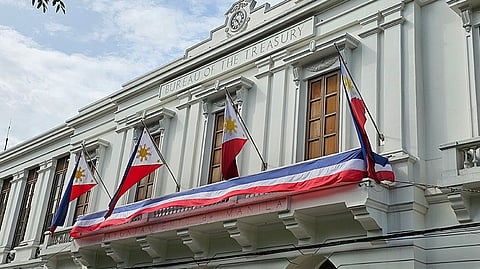
- NEWS
- the EDIT
- COMMENTARY
- BUSINESS
- LIFE
- SHOW
- ACTION
- GLOBAL GOALS
- SNAPS
- DYARYO TIRADA
- MORE

The Bureau of the Treasury (BTr) made a full award of Treasury bills (T-bills) worth P20 billion in its auction on Monday as rates mostly increased amid inflation risks from local economic conditions and US presidential elections outlook.
BTr auctioned off 91-day, 182-day, and 364-day papers which fetched total bids amounting to P69.87 billion or 3.5 times higher than programmed. The new level also increased from the P56 billion the BTr posted in the previous auction last week.
The Treasury awarded the full P6.5 billion for the three-month papers which fetched an average rate of 5.605 percent, up from 5.586 percent recorded on 28 October.
Rates down
BTr awarded another P6.5 billion for the six-month papers which had an average rate of 5.735 percent, down from 5.752 percent posted in the last week’s auction.
Last week, BTr awarded P7 billion for the one-year papers which fetched an average rate of 5.786 percent, an increase from the 5.751 percent posted in the previous auction.
Rizal Commercial Banking Corp. chief economist Michael Ricafort said T-bill rates increased as most investors worry about local and global inflation, following the October inflation forecast by the Bangko Sentral ng Pilipinas(BSP) and a day ahead of the US presidential elections.
“The latest local inflation data is expected to pick up at 2 percent levels in October from the new 4-year low of 1.9 percent in September,” he said.
The BSP Monetary Board projects October inflation to settle within 2 to 2.8 percent due to higher prices of vegetables, fish, and petroleum products. The Board adds overall prices must have risen due to the recent peso depreciation.
The inflation forecast came after severe tropical storm “Kristine” battered Luzon and Visayas toward the end of October, leaving agricultural damage amounting to over P80 million, according to the Department of Agriculture.
In its monetary policy meeting on 16 October, BSP Governor Eli Remolona Jr. said inflation next year might slightly rise from possible 3.1 percent this year to 3.3 percent next year and 3.7 percent in 2026 partly due to higher global oil prices.
His remarks came after oil-exporting Iran fired missiles against Israel on 1 October, prompting investors’ worries on Israeli retaliation.
Ricafort also said T-bill rates increased likely due to investors’ anticipation of higher global inflation as US presidential election surveys show higher victory chances for Republican Party’s candidate and former president Donald Trump.
Trump promises to impose high tariffs on all goods entering the US at 10 to 20 percent and up to 60 percent on Chinese goods, which economists say could be passed on to consumers by exporters.
“The markets priced in a possible Trump victory that could lead to higher inflation and higher US Treasury yields, with the benchmark 10-year tenor at a new four-month high of 4.38 percent, sharply up from the immediate low of 3.60 percent posted on 17 September,” Ricafort said.
Lastly, the economist said investors might be taking advantage of the still high interest rates, as they expect the BSP to match possible policy rate cuts by the US Federal Reserve next month until 2026.
“Some investors lock in still relatively higher yields amid market expectations of future Federal Reserve rate cuts,” Ricafort said.
